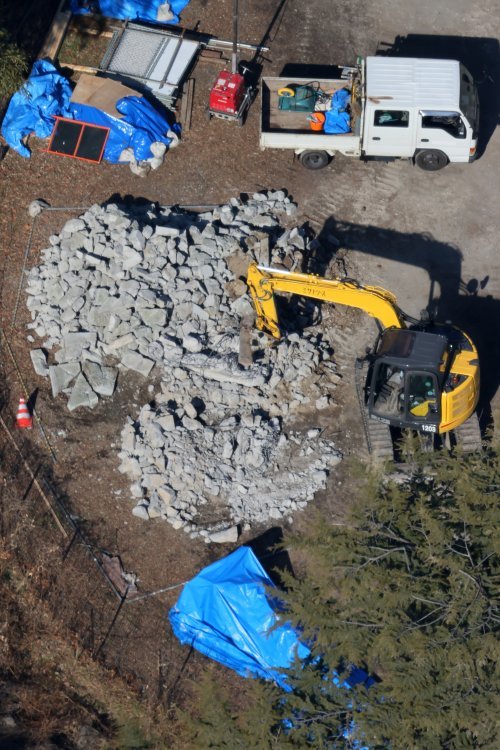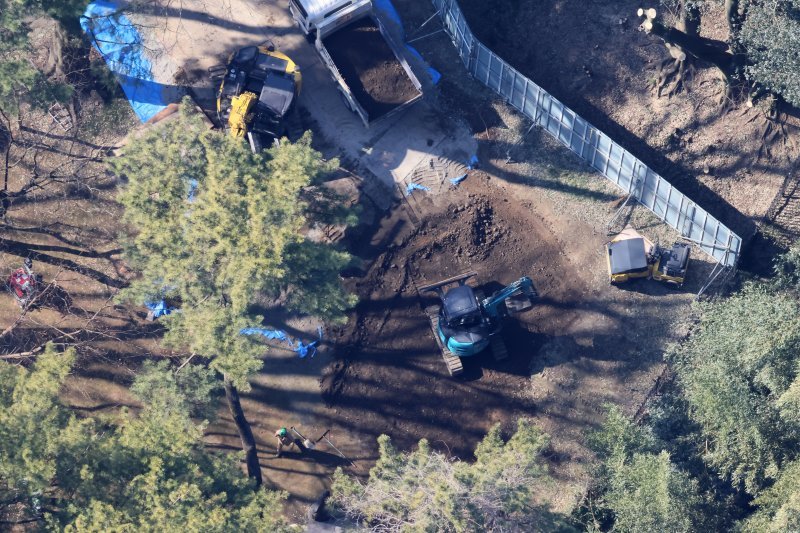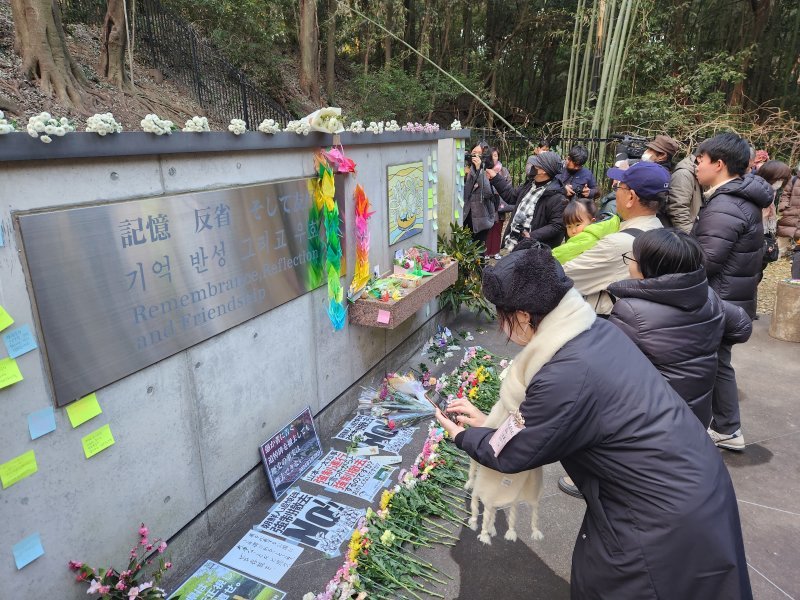It was confirmed on the 1st that the memorial monument for Korean workers in the ‘Gunma Forest’ prefectural park in Takasaki City, Gunma Prefecture, Japan, had been removed. At the site of the memorial, pieces of concrete that had been shattered by an excavator were piled up. The place where the memorial was located became an empty lot.
The Asahi Shimbun reported the site of the demolition of the Korean memorial monument by flying a helicopter over Gunma Forest. Gunma Prefecture has closed the park for two weeks from the 29th, when demolition began, and is banning entry to the general public, including reporters. A strict security is in place around the park to prevent anyone from entering the park.
 At the memorial site for Korean workers in Gunma Forest, Gunma Prefecture, Japan, pieces of concrete that were demolished by an excavator and shattered into pieces are piled up. On the 31st of last month, the Asahi Shimbun filmed the demolition scene from the skies above Gunma Forest via helicopter. Provided by Asahi Shimbun
At the memorial site for Korean workers in Gunma Forest, Gunma Prefecture, Japan, pieces of concrete that were demolished by an excavator and shattered into pieces are piled up. On the 31st of last month, the Asahi Shimbun filmed the demolition scene from the skies above Gunma Forest via helicopter. Provided by Asahi ShimbunIn a photo taken on the morning of the 31st of last month, an excavator, apparently called by Gunma Prefecture, is destroying concrete that appears to have been the memorial platform at the site of the memorial. The shattered concrete pile was taken away by truck. A golden tower-shaped monument about 4 meters high next to the memorial was covered with a blue cover and was lying on its side.
 The site where the memorial monument for Koreans in Gunma Prefecture was demolished. The place where the shattered memorial was removed became an empty lot. Provided by Asahi Shimbun
The site where the memorial monument for Koreans in Gunma Prefecture was demolished. The place where the shattered memorial was removed became an empty lot. Provided by Asahi ShimbunBefore demolition, three signs were attached to the memorial monument, including a metal plate that said ‘Reflection on Memory and Friendship’ in Korean, Japanese, and English, and a notice stating the purpose of erection. This sign was handed over to the owner, a civic group, after the memorial was removed.
The Gunma Prefecture civic group ‘Memorial Protection Group’ said after seeing this photo, “The conscience of peace-loving people has been torn to shreds.” The group said, “Can we forgive the public authorities for arbitrarily destroying facilities to commemorate the dead?” and “We feel angry.” “I am very sorry that Gunma Prefecture has committed a great sin in history,” he protested.
The Gunma Prefecture memorial monument was erected in the ‘Gunma Forest’ in 2004, led by local civic groups. This is the former site of a Japanese Army gunpowder factory, and opened as a citizens’ park in 1974. The notice attached to the memorial said, “We will deeply engrave in our memory the historical fact that Japan caused great damage and suffering to the Korean people, reflect sincerely, and do not forget the past, but look to the future and hope for new mutual understanding and friendship.” It was written.
 A memorial monument for Korean workers in Gunma Prefecture before its demolition. On the 28th of last month, when it was last opened to the public, Japanese citizens gathered to lay flowers and leave messages opposing demolition. Takasaki =
A memorial monument for Korean workers in Gunma Prefecture before its demolition. On the 28th of last month, when it was last opened to the public, Japanese citizens gathered to lay flowers and leave messages opposing demolition. Takasaki = Controversy arose when Japanese right-wing forces took issue with a participant’s remark at a memorial gathering held in front of the memorial monument in 2012 that “it is important to remember the fact of forcible deportation.” Gunma Prefecture, which initially granted installation permission for 10 years, refused to extend it, and in 2022, Japan’s highest court (Supreme Court) ruled that the local government’s decision to not permit was legal. As civic groups rejected Gunma Prefecture’s request for demolition, the demolition was carried out through ‘administrative execution’.
Japanese Foreign Minister Yoko Kamikawa (上川陽子) responded to an inquiry from this newspaper asking about the Japanese government’s position on the removal of the memorial monument for Koreans in Gunma Prefecture, saying, “The government will refrain from commenting on this matter as it is a matter decided by local governments and the ruling has been confirmed by the Supreme Court.” He said. In an editorial on the 30th of last month, Japan’s Asahi Shimbun called the removal of the memorial monument “a sudden and incomprehensible act of violence,” and claimed, “We demand Gunma Prefecture Governor Ichita Yamamoto to stop it immediately.”
Tokyo =
Source: Donga
Mark Jones is a world traveler and journalist for News Rebeat. With a curious mind and a love of adventure, Mark brings a unique perspective to the latest global events and provides in-depth and thought-provoking coverage of the world at large.